After our second day in Kunming, we departed for Baoshan which is fairly close to the border between China and Myanmar. We had to leave very early and I was sleep deprived. We had been told to leave our main luggage in the hotel in Kunming because we would be returning there in a couple of days; so I re-packed some essentials into my backpack with the intention of just taking the one bag as carry on.
In the airport I realized I’d packed things they don’t let you take onto a plane these days – shaving cream, toothpaste etc. I didn’t want to have to throw all that out so I decided to check the bag at the last minute.
Moments later I was handed my ticket and realized that I had left my passport in my bag, which had already been checked through. This was a bit of a freakout – you need your passport for pretty much everything around here. After floundering around in a panic for a few minutes, we were able to work it out with the folks at the airport and they let me through along with another party that had forgotten their passport. I’m pretty sure this only happened because of the esteemed group that we were a part of – if I had just been another tourist, I would have been pretty screwed.
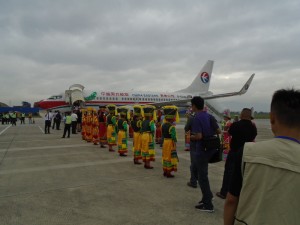
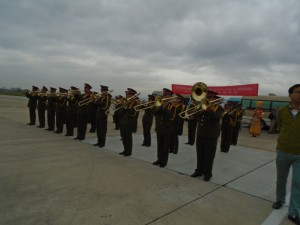
We landed in Baoshan, and were greated by a military marching band and girls in ethnic dress representing the different ethniticies of the region, of which there is a great variety in Yunnan. That was very nice. Then we piled into the busses and set immediately about the next activity which was a long ride through the rural mountains. Our destination was the site of Nujong River (I don’t think I’m spelling that correctly), which was known as the Sawleen river during WW2. There was a particular spot on this river where a key bride had been bombed during the war just barely in time to keep the Japanese from flooding into Kunming, which was a key point for supply drops being brought in by the Hump pilots from India. If the Japanese had made it across that bridge it probably would have been game over for China, so historically speaking it was a very significant event.
We spent several hours of driving along winding roads through the mountains. It was one of the highlights of the trip, for me at least. The scenery was absolutely beautiful, and many of the people living in this area live basically the same way that their ancestors did. We passed countless mountain side farms where people were harvesting corn, rice and tobacco by hand. Farmers were walking their oxen on the side of the road, and you could tell by the way they looked at our bus convoy that we were a very rare sight for them. We stopped at a lookout point that overlooks the Nujong river – the view was simply amazing. Some of our escorts had brought along a couple of drones and were flying them around taking video.
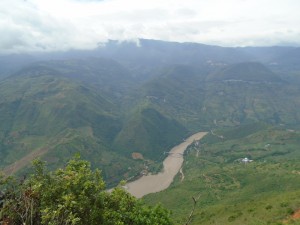
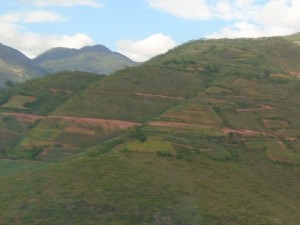
We made a stop in a small village called Mang Lin, where the local government had just installed brand new western style toilets specifically for our group. This was a very impression accomodation. It was far from the nicest bathrooms I’ve ever used, but still much better than a hole in the ground which is still pretty typical in that part of the world.
Once we got near the bridge site on the river, we stopped at a military checkpoint where a lunch had been prepared for us. We were not allowed to bring cameras inside. The meal was hosted in a makeshift courtyard covered by tarps. It was hot and not very windy because we were in the middle of a deep valley, but the food and the company was very good. Most of it was western style food, but in another area they were serving Chinese food for the employees and soldiers. I finished my course of western food and still had a bit of an appetite so I wandered over to the Chinese section and grabbed a bowl. I was the only non-Chinese person there, and they thought I had made a mistake and tried to steer me back to the western side. They gave me a doubtful look when they realized I actually intended to try the Chinese food. I was expecting some kind of crazy spicy stuff, but it was actually pretty tame and tasty.
After the meal we made our way down to the river site which was less than a mile down the road. The locals were out in numbers watching the spectacle we were creating – our guides told us this was probably the most interesting thing that had happened in that area since WW2 had ended, and I can believe it.
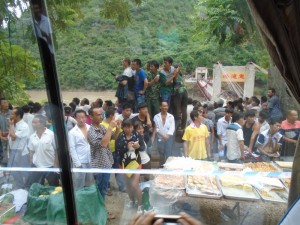
One crazy thing is that even in this most remote part of China, where many people are quite literally living hand to mouth, they still have smart phones! They were all taking pictures of course, which is something we’ve all grown quite used to by this point but it was still quite surprising all things considered.
The bridge that had been blown in WW2 had just been reconstructed in the last 3 weeks, and is to be the site of a new WW2 museum. I don’t know who is going to visit a museum that far out in the middle of nowhere, but that’s what they’re doing. Given how stoked the Chinese are about this particular bit of history, it may actually be quite successful.
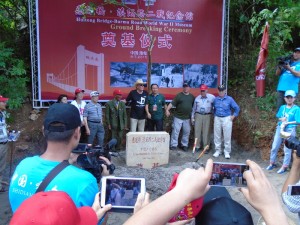
We were all given chrysanthum flowers, which apparently represent the spirit of the dead or something like that, and on the count of 3 we threw them from the bridge into the river to kick off the ceremony. Then we took seats on the opposite side of the bridge and listened to speeches. This part of the journey pretty much sucked. Everybody was supposed to keep their speeches short, which they didn’t do. The speeches ran long while we all sat baking in the sun. Finally somebody got on stage and put an early end to the speeches, after which they officially broke ground for the new museum and had each veteran plant a tree at the site. This was all ceremonial – the trees were already in place. The veterans shoveled some dirt onto them and watered them, and then autographed the shovels. This probably would have been a lot more touching if we weren’t all worn out from sitting in the sun for so long.
Fortunately in the end, everyone came out okay. Then we rode the busses back down through the mountains, and made another stop along the way in a town called Yo Wan. There the veterans gave authographs and posed for more pictures, and there was a book signing as well. After that, we went to Baoshan and finally got to check into our hotel rooms.
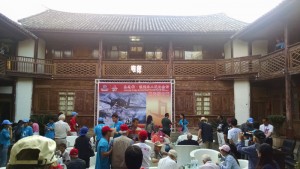
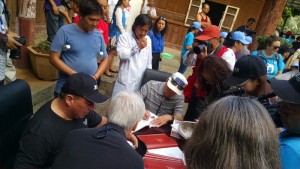
Over all it was an awesome day, but also very long and exhausting. And I had been paranoid the whole time that my bag might have been lost, and my passport along with it which would have been a major problem. I was relieved to finally get my bag and passport back.
The hotel was supposed to be high end but… well, let’s just say it seemed they had built it very hastily. Random switches didn’t seem to work, the elevators would stop on random floors… the place had been very recently built so hopefully they will get those issues ironed out in the near future. It was also the only finished building in the immediate area, and surrounded by construction sites. The whole area is being developed very rapidly.
At any rate, we weren’t there very long – we checked out the next morning to head to Dali.